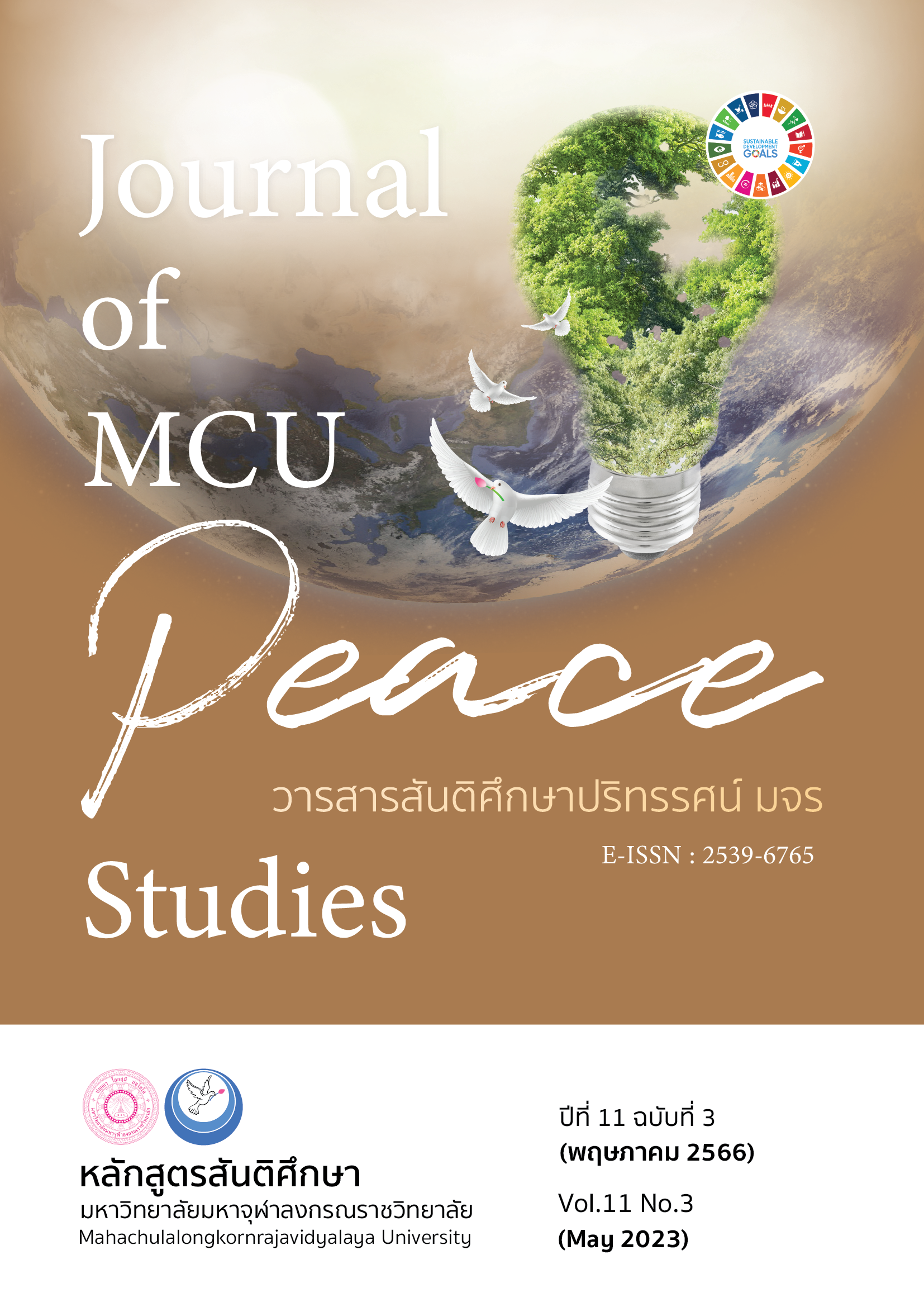การพัฒนารูปแบบการออกแบบการเรียนการสอนอาชีวศึกษา เพื่อส่งเสริมความคิดสร้างสรรค์ในการแก้ปัญหา
Main Article Content
บทคัดย่อ
บทความวิจัยนี้ มีวัตถุประสงค์เพื่อ 1) ศึกษาสภาพปัญหาและความต้องการจำเป็นในรูปแบบการออกแบบการเรียนการสอนอาชีวศึกษา 2) พัฒนาและประเมินความเหมาะสมของรูปแบบการออกแบบการเรียนการสอนอาชีวศึกษา 3) พัฒนาและประเมินประสิทธิภาพของหลักสูตรฝึกอบรมรูปแบบการออกแบบการเรียนการสอนอาชีวศึกษา เพื่อส่งเสริมความคิดสร้างสรรค์ในการแก้ปัญหา กลุ่มตัวอย่าง ได้แก่ ผู้บริหารสถานศึกษา และครูผู้สอนที่จัดการเรียนการสอนตามหลักสูตรอาชีวศึกษา จำนวน 685 คน โดยการเลือกแบบวิธีเจาะจง ผู้วิจัยใช้รูปแบบการวิจัยและพัฒนา เครื่องมือที่ใช้ในการเก็บรวบรวมข้อมูล ได้แก่ แบบสอบถาม และแบบประเมินความเหมาะสม สถิติที่ใช้ในการวิเคราะห์ข้อมูล ได้แก่ ร้อยละ ค่าเฉลี่ย ค่าส่วนเบี่ยงเบนมาตรฐาน ผลการวิจัยพบว่า
1) การศึกษาสภาพปัญหาและความต้องการใช้รูปแบบการออกแบบการเรียนการสอน พบว่า มีปัญหา 6 ด้าน ได้แก่ (1) ด้านการออกแบบวัตถุประสงค์การสอน (2) ด้านการออกแบบเนื้อหา (3) ด้านกำหนดวิธีสอน (4) ด้านการออกแบบสื่อการสอน (5) ด้านการกำหนดวิธีการวัดและประเมินผล (6) ด้านการเขียนแผนการจัดการเรียนรู้
2) การพัฒนาและประเมินความเหมาะสมของรูปแบบการออกแบบการเรียนการสอนอาชีวศึกษา โดยผู้เชี่ยวชาญ พบว่า มีความเหมาะสมของรูปแบบอยู่ในระดับมากที่สุด
3) การพัฒนาและประเมินประสิทธิภาพของหลักสูตรฝึกอบรมรูปแบบการออกแบบการเรียนการสอนอาชีวศึกษา เพื่อส่งเสริมความคิดสร้างสรรค์ในการแก้ปัญหา พบว่า มีผลสัมฤทธิ์คะแนนเฉลี่ยภาคทฤษฎี เท่ากับ 80.03/81.04 สูงกว่าเกณฑ์ที่กำหนดไว้ 80/80 และผลสัมฤทธิ์คะแนนเฉลี่ยภาคปฏิบัติร้อยละ 82.5
สูงกว่าเกณฑ์ที่กำหนดไว้ และผู้เข้ารับการฝึกอบรมฯ มีความพึงพอใจภาพรวมอยู่ในระดับมากที่สุด
Article Details

อนุญาตภายใต้เงื่อนไข Creative Commons Attribution-NonCommercial-NoDerivatives 4.0 International License.
ทัศนะและความคิดเห็นที่ปรากฏในบทความในวารสาร ถือเป็นความรับผิดชอบของผู้เขียนบทความนั้น และไม่ถือเป็นทัศนะและความรับผิดชอบของกองบรรณาธิการ ยินยอมว่าบทความเป็นลิขสิทธิ์ของวารสาร
เอกสารอ้างอิง
Dejagupta, P., & Kengkan P. (2012). Innovate Learning with Classroom Action Research. Bangkok: Publisher of Chulalongkorn University.
Hiepsakul, J. (2006). Problems and Needs of Teaching and Learning Management for Training Courses. (Doctoral Dissertation). King Mongkut’s Institute of Technology North Bangkok. Bangkok.
Krejcie, R. V., & Morgan, D. W. (1970). Determining Sample Size for Research Activities. Educational and Psychological Measurement, 30(3), 607-610.
Leekitwattana, P. & Pimdee, P. (2007). Demand for Industrial Technicians' Manpower of Establishment in In Industrial Estates. (Research Report). Bangkok: King Mongkut's Institute of Technology Ladkrabang.
Lertpanya, A. (2016). The Curriculum Development of Teacher Training in the Vocational Instruction to Develop for Work Problem Solving Thinking Skills. (Doctoral Dissertation). King Mongkut’s University of Technology North Bangkok. Bangkok.
Methapatra, P. (2006). Vocational and Technical Curriculum Development. Teaching Document 200401 Department of Mechanical Education Faculty of Industrial Education King Mongkut's Institute of Technology North Bangkok. Bangkok: King Mongkut's Institute of Technology North Bangkok.
Nakunsong, T. (2009). Development of Training Courses for Personnel Development Case Study: Child Development Center Subdistrict Administrative Organization. (Doctoral Dissertation). King Mongkut’s Institute of Technology North Bangkok. Bangkok.
National Statistical Office. (2013). Survey of Informal Workers 2013. Bangkok: National Statistical Office.
Office for Social Promotion of Learning and Youth Quality. (2014). Apiwat Learning to the Turning Point of Thailand in Academic Conference 6-8 May 2014. Bangkok: Sahamit Printing and Publishing.
Office of The Education Council. (2010). National Education Standards. Bangkok: Office of the Education Council.
Office of Vocational Education Commission. (2017). Vision and Strategy for Vocational Development. Bangkok: Office of Policy and Planning.
Office of Vocational Education Standard and Quality. (2015). Vocational Education Standards 2012, Criteria and Guidelines on Quality Assurance in Vocational Education, 2012 Revised (2nd Edition). Bangkok: Office of Vocational Education Commission.
Office of Vocational Education Standard and Quality. (2020). Higher Vocational Certificate Program 2020. Bangkok: Office of The Vocational Education Commission.
Panit, W. (2012). Methods for Creating Learning for Students in the 21st Century. Bangkok: Sodsri-Saritwong Foundation.
Phraewanich, P. (2000). The Development of Teaching Styles Using Cognitive Maps to Enhance Creative Thinking Ability of Nursing Students. (Doctoral Dissertation). Chulalongkorn University. Bangkok.
Plianphu, S. (2008). Principles of Teaching and Learning Industrial Technicians Concept of Human Development. Bangkok: Edison Press Products Co., Ltd.
Sararattana, W. (2013). A New Paradigm in Education the Case of Perspective on 21st Century Education. Bangkok: Thiphawisut Department Store.
Siritharangsri, P. (2014). Upgrading the Quality of Thai Teachers in the 21st Century in Apiwat Learning to the Turning Point of Thailand 6-8 May 2014 (pp.1-10). Bangkok: Office for Social Promotion of Learning and Youth Quality.
Stirayakorn, P. (2004). The Development of Training Model for Teaching Practice Techniques in Organizations. (Doctoral Dissertation). King Mongkut’s Institute of Technology North Bangkok. Bangkok.
Thopol, S. (2002). Development of Training Courses for Heads of Departments under the Department of Vocational Education. (Doctoral Dissertation). King Mongkut’s Institute of Technology North Bangkok. Bangkok.
Utranan, S. (1989). Fundamentals and Principles of Curriculum Development. Bangkok: Mitsiam Printing House.
Vongvanich, S. (2005). Research and Needs Assessment. Bangkok: Publishing House of Chulalongkorn University.


